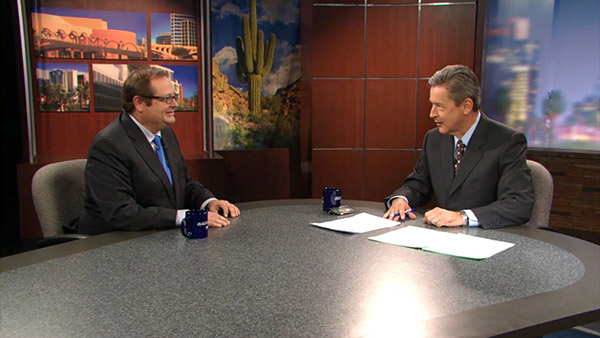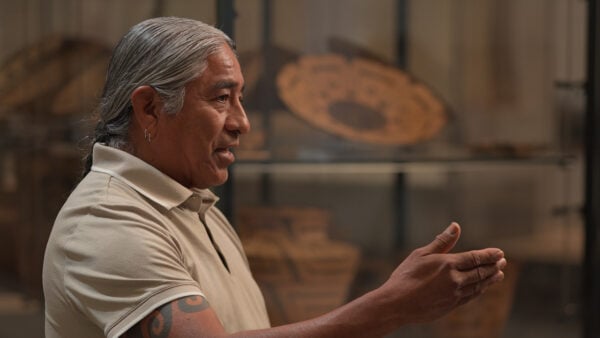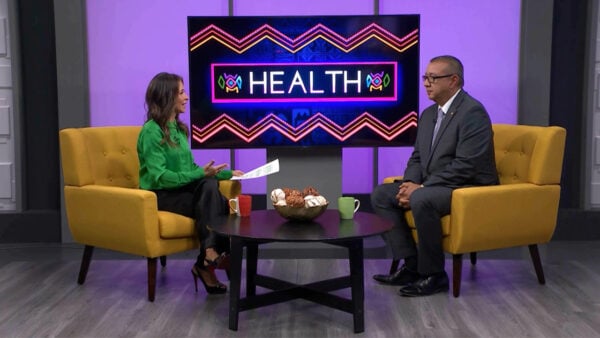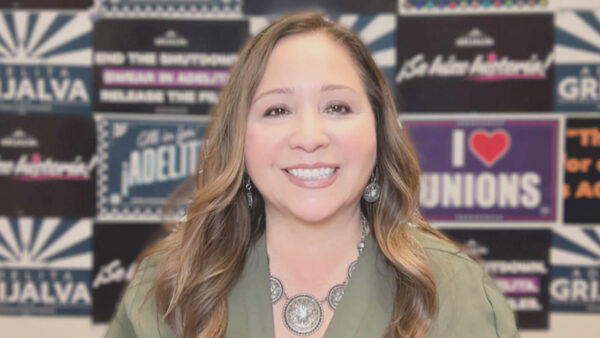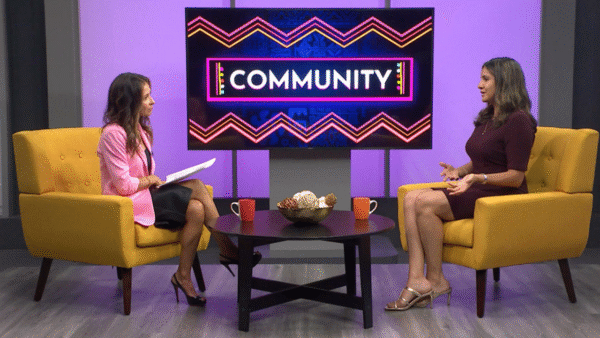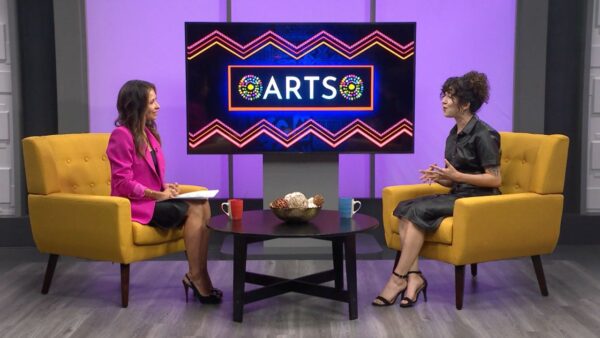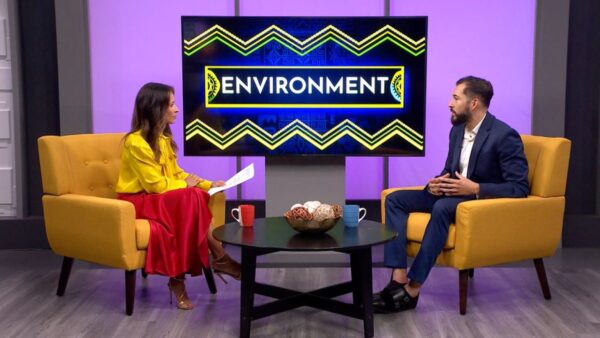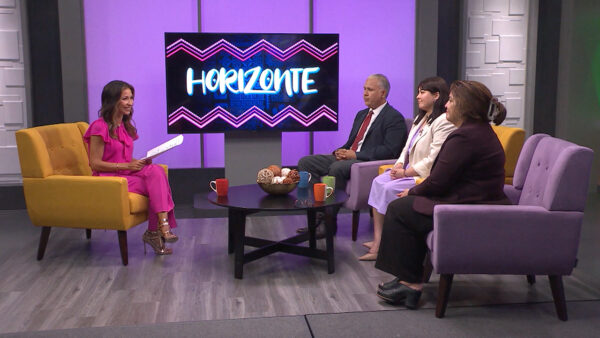The Dream Act is a bill that has been introduced several times, but never passed. It would allow students to apply for permanent legal residency if they entered the country before they were 16, lived here for at least five years and have graduated from high school. Four Phoenix students known as the “Wilson Four,” who were detained during a trip to the U.S.-Canada border three years ago, would be able to stay in the United States if this bill is passed. Guest Judy Flanagan, one of the attorneys representing the “Wilson Four” will talk about their situation and the DREAM Act.
>> José Cárdenas:
Tonight on "Horizonte," state and local law enforcement officials meet to talk about immigration enforcement in Arizona. You'll hear about their ideas. We'll discuss a controversial federal bill that would legalize the status of children of undocumented immigrants and could help keep four valley students from being deported. Also, an organization set up to offer people affordable healthcare. All next on "Horizonte."
>> Announcer:
Funding for "Horizonte" is provided by Bank of America, who applauds those who strive for excellence. Bank of America, higher standards, and by SRP. SRP's business is water and power, but our dedication to the community doesn't stop there. SRP, delivering more than power.
>> José Cárdenas:
Good evening, I'm José Cárdenas. Welcome to "Horizonte."
Governor Napolitano has asked state and local law enforcement to come up with plans for agencies to work together to enforce federal immigration laws in Arizona. Officials met at an immigration Summit last week in Flagstaff to talk about different proposals. With us to talk about what happened at the summit is Arizona Department of Public Safety Deputy Director David Felix. The Summit was organized by DPS. Director Felix, welcome to "Horizonte."
>> David Felix:
Thank you.
>> José Cárdenas:
Felix is a common name in Sonora. Any roots or connections there?
>> David Felix:
It is. My great-great-grandmother brought my great-grandfather north from Sonora back in the late 1850s and settled in the area around Florence, between Florence and Coolidge.
>> José Cárdenas:
You've got personal experience with immigration. How did this Summit come about?
>> David Felix:
The Governor signed executive order 2005-13, which tasked the Department of Public Safety, specifically director Roger Vander pool with bringing together a cross section of law enforcement officials and criminal justice executives to discuss the issue of illegal immigration.
>>José Cárdenas:
The whole Summit has been shrouded in controversy from the start, suggestion that it was politically motivated. In the past, law enforcement made it clear that they didn't want to get involved in immigration. What was the reaction to the Governor's call for this summit?
>> David Felix:
Well, from the Department of Public Safety standpoint, we assist local law enforcement. That's statutorily one of our charges. So it's appropriate for us to take the lead on this issue. For local law enforcement, they are generally very, very busy and taxed with the resources they have responding to community needs, so they were concerned about getting involved with the illegal immigration enforcement for that reason. And we saw that DPS would have been the appropriate agency to assist them in some way.
>> José Cárdenas:
Now, as I mentioned, shrouded in controversy from the start, even when The Summit was underway, we had this big issue about whether it should be open to the public. Tell us what was going on there.
>> David Felix:
Selectively, the criminal justice community wanted to have some very candid pointed and sometimes possibly should be able to discuss issues that were -- that may have been sensitive. So we wanted initially to have an opportunity to discuss these issues in a closed environment with the criminal justice professionals that were there, and then at the appropriate time, bring it to both the public, via the media, and also through the legislature, once those plans had been fleshed out a little bit.
>> José Cárdenas:
Who was there?
>> David Felix:
Well, the actual summit was attended by over 100 -- probably close to 150 criminal justice professionals. The panel consisted of, for example, Sheriff DUPNIK from Pima County, representing county was Chief Deputy David Hendershott, representing a metropolitan county for Sheriff Joe Arpaio. Chief Jack Harris from the Peeks Police Department. We had Roberto Medina from Immigration Customs Enforcement and representatives from the Border Patrol.
>>José Cárdenas:
Any other federal entities involved there?
>> Right now, because those two are the ones primarily responsible for the immigration issue, and enforcement of immigration. Both immigration and customs enforcements typically called ICE and the border patrol were the two federal agencies we invited to The Summit.
>> José Cárdenas:
Generally what were the topics discussed?
>> David Felix:
There were a number of them. The one that affects law enforcement the most is the issue of capture and release. That is a situation where law enforcement officers come across in the normal course of their duties, large numbers of undocumented aliens and simply don't have either the training or the resources to deal with those large groups of people. For DPS, we encounter them a number of ways. Typically we will he have them where they may be involved in a traffic accident on the highways and the result of that collision, we've got large numbers of folks out there, and we don't have any way to deal with them.
>> José Cárdenas:
And in terms of the capture and release, the situation we're dealing with there, you have immigration officials who because they don't have the man power, have to let people go that they've stopped for immigration violations or --
>> David Felix:
Yes, and I want to make this real clear. The federal authorities, it's not an unwillingness to do this, it's just that their resources are so taxed and particularly ICE has such a shortage of resources to respond to those situations that they just don't have enough people. It's not because they haven't agreed to it, they have to limit their response because of lack of resources.
>> José Cárdenas:
What's the solution?
>> David Felix:
We see several things occurring. The one that affects law enforcement most in this capture and release scenario would be the proposal that Governor Napolitano and director Vander pool put together which is to dedicate 15 state officers, especially train them in immigration enforcement, provide them with the equipment and everything that they would need and partner them with one of the federal agencies to respond to those situations, so they would be able to determine alienage, legally, and then if someone was here and found to be an illegal alien, then to process them into the federal system for deportation.
>> José Cárdenas:
Would these 15 officers actually be on assignment or on patrol with federal immigration officers?
>> David Felix:
Yes, the concept would be that they would be with those immigration officers in the same vehicle to respond to those situations. They would not do any proactive enforcement. They would not go into job centers. They would not go in and conduct neighborhood sweeps. They would only be in a response mode for those situations when local law enforcement comes across large numbers of undocumented aliens. And it appears that there is some aspect of trafficking, human trafficking, that's associated with that.
>> José Cárdenas:
Now, where do the resources come from to do this? Are we talking about hiring 15 new DPS officers?
>> David Felix:
They come from a number of places, but we're looking with officers with certain minimum standards that would go into that unit, and they would come from both the resources we have now, officers on street, as well as possibly lateral officers that we would hire that are already certified officers that could be trained for that unit specifically.
>> José Cárdenas:
Now, if we're only talking about one more person for each of these units, how much of a significant benefit will come from this?
>> David Felix:
Well, we see it as being a significant benefit in that today that resource is very limited. The response, particularly in the Phoenix area, and that's what we're looking at is an operational area, from downtown Phoenix of about 60 miles going out from that point, and they would be able to respond to those where they are getting no response today. We don't know what the effect may be. We're saying no different than thinking that we could stop every speeder on the 101, we're not going to be able to respond to every single event where this occurs. We think we'll make a significant impact in being able to go and take responsibility for those individuals and allow the local law enforcement to get back to what they are paid to do in their communities.
>>José Cárdenas:
Why the focus on Maricopa County?
>> David Felix:
Because we see that's where it seems to be occurring the most. The border patrol particularly is deployed to the south along the border, so there are large numbers of border patrol agents along the southwest border. The farther north and particularly the area around Phoenix, there are virtually no border patrol agents here, only ICE, and they have only limited resources. We see this as a pilot program in the metropolitan area.
>>José Cárdenas:
Does that mean that the target of this program are the, the smugglers?
>> David Felix:
That's right. We are focused on being able to tie the debriefing of these individuals to attacking those organizations that are engaged in violent human smuggling. That really is probably the top priority, and being able to assist ICE and other federal agencies in being able to identify who those people are, and put them out of business.
>> José Cárdenas:
Now, in the past, law enforcement agencies have been reluctant to get involved in any immigration related activities. We had the Chandler situation a few years ago that left a bad taste in everybody's mouth, and the concern has been that if law enforcement is involved in immigration, it will have a chilling effect on people who would otherwise be willing to report crimes to assist you in dealing with serious crimes. How was that handled? Or how will it be handled?
>> David Felix:
That was expressed at The Summit. The concern is we have undocumented aliens embedded in our communities. If they are victims or witnesses to a crime, that because they think someone is going to come there and take them away, they might not want to cooperate with police. That's why we target this to large numbers of undocumented aliens, say at least a dozen people, is to offset that concern. So that law enforcement can do their job in deterring crime and being able to solve crimes with victims and witnesses that are undocumented aliens and they are not affected. The other aspect of this that's critical is the education to the public. We have to have a good, strong, education process involved with this so that the communities know exactly what our focus is, so they don't think that somehow we're out here just in other enforcement border patrol agent.
>> José Cárdenas:
How will you communicate that?
>> David Felix:
A number of different ways. We will use a strong campaign to go public with this. As we said, the appropriate time for our strategies to be made public is through the media, through a number of initiatives that will have -- to educate the public. We haven't fleshed those all out yet, but the media will be a very strong partner in this.
>>José Cárdenas:
We've got 40 seconds left in the interview. Can you summarize the major conclusions and the next steps we'll be seeing coming out of the summit?
>> David Felix:
Sure, we talked about the 12-person immigration enforcement assist unit. That's one of them. Another one had to do with the aspect of sharing information with Mexico so that we have better communication with them about a variety of crimes, including illegal immigration.
>>José Cárdenas:
Hopefully dealing with the situation we just had with the fugitive who got into Mexico and they didn't know he was wanted here?
>> José Cárdenas:
Perfect example of where we could have communicated better with them and let them know what was going on with those situations. Another one is in the area of fraudulent identification. The department of liquor is going to take on the responsibility of forming a taskforce to attack those organizations that are developing fraudulent and fake identification, including passports and Social Security cards that facilitate smuggling. That's another one of those things that came out of the summit.
>> José Cárdenas:
Thank you for sharing this interesting report on The Summit. Thank you for being with us.
>> David Felix:
Thank you.
>> José Cárdenas:
The "dream" act is designed to give children of undocumented immigrants a chance to earn legal residency status after serving in the military, completing some college, or having graduated from high school. Many have asked congress in the past to pass this legislation. It would affect some Phoenix students known as the "Wilson four," all brought to the United States as children and facing deportation to Mexico. Last week, a news conference was held to talk about the "Wilson four" case.
>> Judy Flanagan:
These are kids that were brought here to the United States through no fault of their own. They are here. They did not make the decision when they were toddlers to cross the border.
>> Jaime Damian:
Yes -- I worked hard for it, and everything I dreamed of is here and they are going to send me somewhere else and it's going to be hard.
>> Luis Nava:
The hardest thing is probably saying bye to my brother because currently he has leukemia, so he's going through chemo treatment.
>> José Cárdenas:
Joining us to talk about the Dream Act and "Wilson four" case is one of their attorneys, Judy Flanagan.
>> José Cárdenas:
Judy, thank you for joining us.
>> Judy Flanagan:
Thank you.
>>José Cárdenas:
First the Wilson four, who are they?
>> Judy Flanagan:
They are four former Wilson High School graduates who were on a solar boat competition in Buffalo, New York. They had won second place in a Tempe Town Lake competition in March of 2002, and then in June of 2002, had an intercollegiate competition to race their boat.
>> José Cárdenas:
These are honor students?
>> Judy Flanagan:
Honor students that had done well in high school and I think 209 hours of their own time in putting this boat together. Essentially, they qualified the first day of their competition and then one of the teachers thought that it would be fun to go to Niagara Falls to his see the Falls from the Canadian side. Although the students never crossed to Canada, they were essentially apprehended by immigration officials while they were there.
>> José Cárdenas:
Apprehended trying to get into Canada?
>> Judy Flanagan:
One of the teachers inquired whether they could use their school IDs to cross the border. They actually never crossed the border.
>> José Cárdenas:
So it was that inquiry that led to further questioning and their detention?
>> Judy Flanagan:
They were detained for about 9 hours, fingerprinted, photographed, asked a variety of different questions, and placed into removal proceedings.
>> José Cárdenas:
This was two years ago?
>> Judy Flanagan:
Three years ago.
>> José Cárdenas:
What are they doing now?
>> Judy Flanagan:
They are continuing with their lives.
>> José Cárdenas:
Are they all graduates now of high school?
>> Judy Flanagan:
They've all graduated from high school. Several of the students have actually gotten degrees. Juliana has an AA degree from Phoenix College. Luis will get his diploma in office from the W.P. Carey school of business, in management.
>> José Cárdenas:
Is this something that federal awe authorities would typically focus on? Wouldn't this be the kind of thing that after a little bit of questioning, they would perhaps look other way? Is this typical?
>> Judy Flanagan:
It's hard to say. I think it's unusual to have four honor students in removal proceedings. I think the immigration officials put them in proceedings when they found out that they were undocumented, but it's certainly an unusual case that we have essentially the poster children here for the Dream Act, students that came here at a young age, have done well in school, and really should have the opportunity to go on to fulfill their dreams.
>> José Cárdenas:
Were these students the inspiration for the Dream Act?
>> Judy Flanagan:
The bill actually had been introduced in the senate prior to their case getting started, but somewhat ironically on June 20th, the day they were arrested was the day it was introduced into the senate judiciary committee.
>> José Cárdenas:
Let's talk about some of the details of the Dream Act. What does it provide for?
>> Judy Flanagan:
Basically it will give students that are undocumented that have graduated from high school, as long as they have been in the United States for five years at the time the bill is enacted, an as long as they are under the age of 16 at the time they entered the United States, it will give them permanent residency. There'll be conditions on their residency, and once they do two years in college or two years in the military, with their conditional residency, they can apply to remove the conditions and become permanent residents.
>> José Cárdenas:
The conditions being what? Travel restrictions or restrictions on when they can apply for residency?
>> Judy Flanagan:
They wouldn't be full-fledged permanent residents yet. They would have six years to complete college or do two years in the military. Once they do that, they can apply to lift the conditions.
>>José Cárdenas:
Seems like a pretty reasonable piece of legislation. Why has congress not passed it?
>> Judy Flanagan:
Yes, we think it's a very reasonable piece of legislation. It's hard to say exactly why congress hasn't passed it. It did pass 16-3 out of the Senate Judiciary Committee in October of 2003, but then never went to a senate vote. Immigration, I suppose say controversial issue for people. Here, though, when you have students that are here in the United States, didn't make the decision to come here, have done well, to me is seems like a simple issue. It's gotten bipartisan support, more than 50 senators have endorsed --
>>José Cárdenas:
Who are the principal sports of the legislation?
>> Judy Flanagan:
Orrin Hatch, a Republican from Utah, is the principal author of the bill. Senator MCCain here in Arizona is a co-sponsor of the Dream Act.
>>José Cárdenas:
Who is leading the opposition?
>> Judy Flanagan:
I'm not really sure who the opponents are. I know it has gotten bipartisan support, both sides of the aisle. It addresses the issue that we have invested in the students' education, the students want to give back to the United States, and this is an avenue for them to do that.
>>José Cárdenas:
What about in the House?
>> Judy Flanagan:
In the House, it's the student adjustment act that was initially introduced probably several times as well. It has to be reintroduced each session. It hasn't had as much movement. I think the immigrant groups that are working on this feel that the Senate Bill is the avenue that they are using first once that gets to a floor vote, they think that the action will happen in the House of Representatives quickly afterwards.
>>José Cárdenas:
Now, the concern expressed by opponents has been that you are in effect rewarding lawbreakers? What do you say to that?
>> Judy Flanagan:
The answer is these kids are here through no fault of their own. When Luis was two years old, he didn't make a decision to come here. So the students are essentially blameless. They are in a position through no fault of their own, and what the Dream Act would do would simply be to reward their hard work. If they graduate from high school, it would provide incentive for them to finish high school and to go on, do the two years in college or to serve our country through the military.
>>José Cárdenas:
We've got just a little bit of time left. Tell us about Congressman Pastor's private bill.
>> Judy Flanagan:
Congressman Pastor has introduced a private bill for the four students, and what it would do essentially is to stop the deportation or any grounds for deportation of the four students. It's difficult to get private legislation passed, but it's one measure of the support that we have from our Arizona delegation and we're very happy that Congressman Pastor has introduced this bill.
>>José Cárdenas
: Judy Flanagan thank you for joining us on "Horizonte" to talk about the Wilson four.
>> Judy Flanagan:
Thank you for having me.
>>José Cárdenas:
There is an organization designed to help low-income and uninsured residents of Maricopa County get healthcare coverage. Here to tell us more is Terry McPeters. McPeters is the Executive Director of Healthcare Connect. Terry, thank you for joining us on our show.
>> Terry McPeters:
Thanks for having me.
>>José Cárdenas:
Tell us the history.
>> Terry McPeters:
This was started through the healthy community AHCCCS programs, which is funded through the Department of Health Services.
>>José Cárdenas:
Federal?
>> Terry McPeters:
Yes, it is a federal program. It was initiated back in the Clinton administration when the problem of the uninsured was becoming more and more -- brought more into the awareness of the community.
>>José Cárdenas:
This is available nationwide?
>> Terry McPeters:
There are programs nationwide. The programs are designed so that each community applies for a federal funding, and they can take that funding and do something within their community to improve access to healthcare for low income and uninsured or underinsured people in their community. There are no stipulations on how you create that access. You just have to create access to healthcare.
>>José Cárdenas:
In Pima County, they've been doing this for the last several years. This is a program similar to the one you have initiated?
>> Terry McPeters:
Yes.
>>José Cárdenas:
What was Maricopa County doing with these funds in the past.
>> Terry McPeters:
We hadn't applied for them in Maricopa County in the past. Pima County was the first one in Arizona to apply. They were one of the first 23 grantees that were awarded funding through this program. And as that program was becoming more and more successful, they started talking about expanding, and, of course, Maricopa County was the next best or the next -- not the next best, but the next community that seemed to be the most obvious for it to come into.
>>José Cárdenas:
Give us the broad outlines of the program. Who is eligible and what services are provided?
>> Terry McPeters:
Eligibility is based on three primary areas, one is residence of Maricopa County, so we would look at a utility statement, a driver's license, something that would have the name of the applicant and residence within Maricopa County. The second piece is income, and the income requirements are from 100 to 250% of federal poverty levels. That's around $9500 a year, up to $23,000 a year for a single person, and you can add approximately $3,000 to that income for every additional family member. So the federal poverty level is based on the size of your family.
>>José Cárdenas:
And the third criterion is?
>> Terry McPeters:
They cannot be eligible for any public program, such as Medicare, Medicaid, any program sponsored by the state or federal government and they cannot be eligible for employer sponsored health care coverage.
>>José Cárdenas:
These are people not covered by AHCCCS?
>> Terry McPeters:
Correct. They are over the income limit for AHCCCS or have been denied for some other reason.
>>José Cárdenas:
What's the cost of the program?
>> Terry McPeters:
The cost is $50 a year for an individual person, and $100 for families of two or more. There will be additional out-of-pocket expenses to our members as they access services, but if you are a healthy person and you want something that is a safety net in case you get sick or have problems, there is no additional out-of-pocket costs to you.
>>José Cárdenas:
As I understand it, right now, it's federal funds paying for the program, that's for three years; correct?
>> Terry McPeters:
Correct.
>>José Cárdenas:
After that, where do the monies come from to pay for the costs of the program?
>> Terry McPeters:
Once the federal funding goes away, we will be looking to the community to help keep this program sustaining. We will work with other nonprofit organizations. The enrollment fees that we collect will go towards sustain abilities well.
>>José Cárdenas:
Does that mean fees will go up?
>> Terry McPeters:
No, the fees will not go up.
>> José Cárdenas:
Who are you serving right now? What are the demographics?
>> Terry McPeteres:
Right now we have 2500 people enrolled. They are primarily Hispanic and women.
>> José Cárdenas:
And how many people will be eligible?
>> Terry McPeters:
There are potentially 200,000 people in Maricopa County alone, who are in our target market, which is in that income range without access to healthcare.
>> José Cárdenas:
How many people do you eventually expect to be serving?
>> Terry McPeters:
We figure by the time we reach the end of our third year, that we will have anywhere between 10 and 15,000 active members at any given time.
>> José Cárdenas:
And the benefit to the rest of the community is what?
>> Terry McPeters:
The benefit is that we are creating a healthier community. We are creating access to affordable healthcare and one of our primary goals is to try to reteach people the importance of wellness and prevention, establishing with a physician so that they can get routine care, identify any potential problems before they become severe or acute, and they end up in the emergency room. So that will free up our emergency room resources to handle true life-threatening emergencies and also help decrease the cost of healthcare in the long run because people are able to access care at a more affordable rate. They are getting the right care at the right time at the right place, instead of waiting until they get sick and acute and go into the emergency room.
>> José Cárdenas:
As I understand it, the majority of the participants thus far are Hispanic females; is that right?
>> Terry McPeters:
Yes.
>>José Cárdenas:
Any reason for that? Is it prenatal care? Pregnancy care?
>> Terry McPeters:
No, what we have found, since women are primarily the decision-makers when it comes to healthcare in a family -- that's not just the Hispanic families, that's all families -- but what we are finding is that because the Hispanic community, unfortunately, tends to fall into the lower income ranges for the majority of the positions that are out there, they are primarily getting the part-time jobs and day labor jobs where they don't get any healthcare offered to them. When we go through the enrollment process, we do screen all of the household for eligibility into any public program, and so as we're screening these families, the kids and the family may be eligible for the KidsCare program so instead of enrolling them into healthcare connect, we would get them enrolled into KidsCare.
>>José Cárdenas:
Legal residency is not one of the criterion?
>> Terry McPeters:
No, it is not. During the screening process, we will ask about residency, whether or not they are a U.S. citizen. The reason we do that is because we are also looking to see if they are eligible for the state programs, and because that is a requirement for AHCCCS and for KidsCare, then we do ask that question.
>> José Cárdenas:
Has the publicity surrounding proposition 200 had any impact?
>> Terry McPeters:
I think it has to some degree, yes. I think people with the passing of Prop 200 have some fear about information being released to agencies that could potentially get them deported back into Mexico or any other country where they are here from, and so we want to make sure that everybody understands, information given to us is kept very confidential. We don't share any of our information that we receive with INS or any of those other agencies that would get shared with AHCCCS, if they are eligible, but those are the people that are here and have the residency established already.
>>José Cárdenas:
Ms. McPeters, thank you for joining us tonight.
>> Terry McPeters:
Thank you.
>> José Cárdenas:
We have a link to healthcare connect on our web site, www.azpbs.org. Just click on "Horizonte" and you'll also see information on transcripts and upcoming shows.
>>> José Cárdenas:
That's our show for tonight. Thank you for joining us. I'm José Cárdenas. Have a good night.
Judy Flanagan: Attorneys, Dream Act and "Wilson four;
